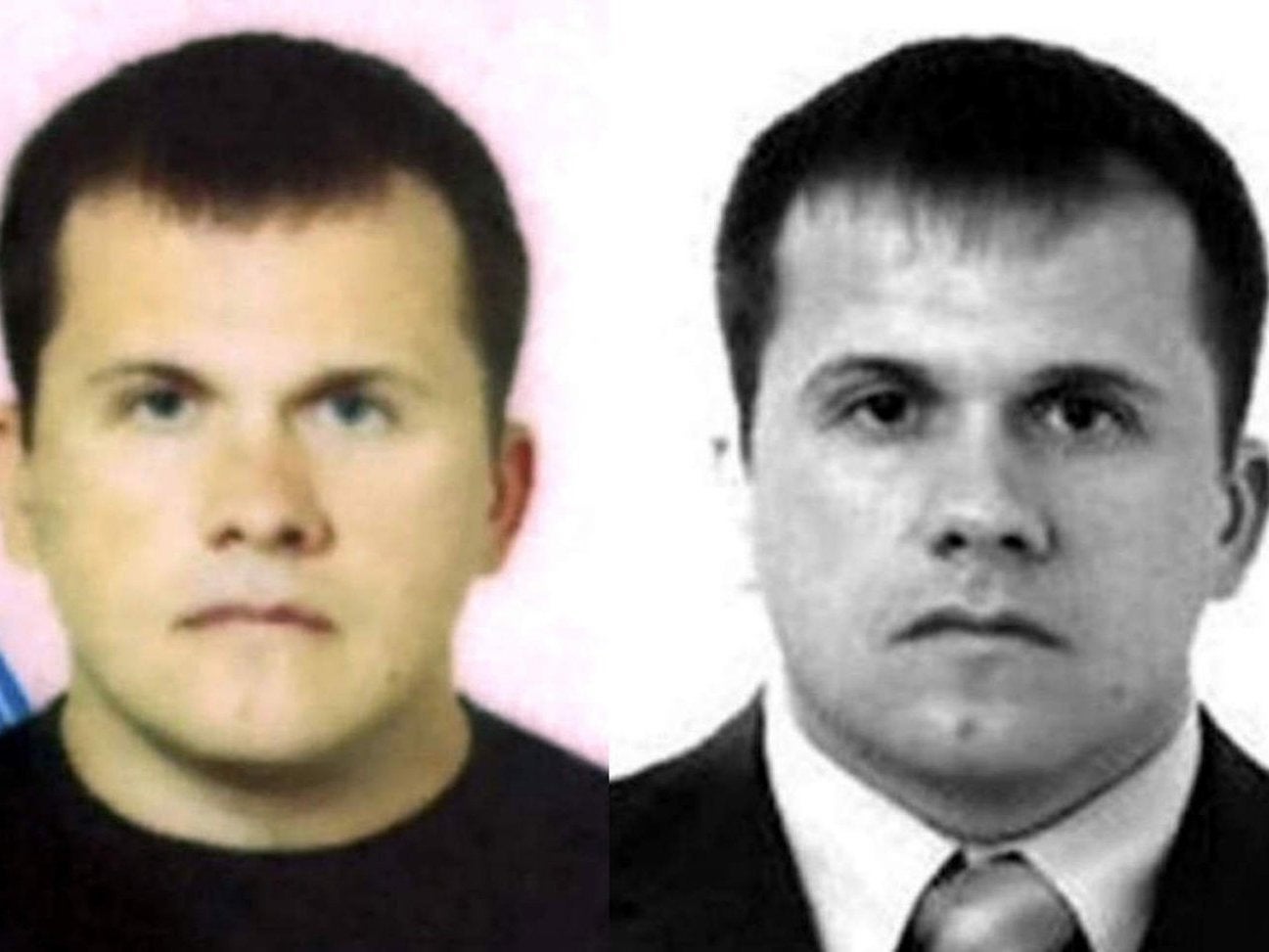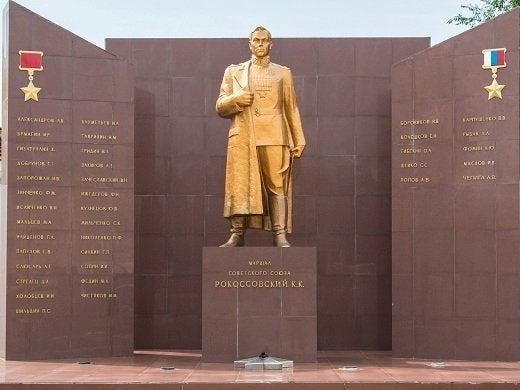Salisbury novichok attack: Russian suspect Dr Alexander Mishkin 'photographed shaking Vladimir Putin's hand'
Residents in Mishkin’s home village believe he received the award for services in Ukraine
A Russian agent accused of launching the Salisbury nerve agent attack was photographed shaking Vladimir Putin’s hand, online investigators have said.
Members of the Bellingcat website told a briefing at the Houses of Parliament that the alleged GRU assassin who arrived in Britain under wallathe name Alexander Petrov has been identified as Dr Alexander Yevgenyevich Mishkin.
Christo Grozev, an investigator who worked on the case, said the 39-year-old had been awarded as a “hero of the Russian Federation” by presidential decree in 2014.
He added that women living in Mishkin’s home village had seen a photograph “of President Putin shaking Mishkin’s hand” and presenting him with Russia’s highest accolade.
It was also given to the first alleged assassin identified – Colonel Anatoliy Chepiga – at a similar time.
Residents in the village of Loyga, where Mishkin lived until he was 16, told Bellingcat’s partners from The Insider that his grandmother had shown them the photograph.
“The source said the grandmother treasures this photo and does not show it to everyone, and never lets anyone else hold it,” their report said.

Investigators reached Loyga – which sits in “the middle of nowhere” in marshland – on Monday and were told that the woman had left to visit relatives three days before.
Locals believe the award was for Mishkin’s actions in Ukraine, either relating to the annexation of Crimea or the extraction of President Viktor Yanukovych amid anti-Russia protests in early 2014.
Incomplete border crossing data obtained by Bellingcat shows that Mishkin travelled to Ukraine using his alias multiple times between 2010 and 2013, frequently crossing by car into the self-declared Transnistrian Republic.
According to official records, he was born on 13 July 1979 in the village of Loyga in the Arkhangelsk district.
Mr Grozev noted that the village sits in permafrost and is currently covered in slush – which was the reason the two alleged spies said they had to go back to Salisbury two days in a row while posing as tourists on Russian state television.
Several residents recognised the man whose image was released by British authorities under the alias “Alexander Petrov” as “our local boy” Mishkin, including a woman whose son played with him as a child.
No public record has yet been found of Mishkin receiving the “hero of Russia award”, but experts say the secrecy is not unusual for recipients who earn recognition through intelligence work or covert military operations.
Chepiga’s award was proven by a monument that listed his real name.

In September 2014 – around the time both men are believed to have been decorated – they moved to plush apartments near each other in Moscow.
Mishkin’s two-bedroom flat, which was registered in the name of his wife and two daughters, had a tax value of approximately €350,000 (£305,000), while Chepiga’s was even larger and more expensive.
Both were passed to the men’s families on the basis of a “contract of transfer of ownership”, which indicates they may have been granted as a form of bonus from the Russian state, Bellingcat said.
Investigators uncovered Mishkin’s true identity after British media reported a police source saying that while “Alexander” was his real name, Petrov was not.
His cover passport records referred to a previous passport issued in St Petersburg in 1999, and investigators started to put together a list of Alexanders who lived in the city at that time, and of a similar age, to narrow down potential suspects.
One of them lived in a shared student flat which was directly opposite the St Petersburg Military Medical Academy where Mishkin studied.
One fellow graduate said they recognised him as “Peskov” in the RT interview and said “many of the graduates from Mishkin’s class and department had been contacted by Russian security services over the last few weeks, and instructed not to divulge his identity to anyone”.
Mishkin studied at the academy’s fourth faculty, which trains military doctors for Russia’s naval armed forces, and specialised in undersea and hypobaric medicine.
He graduated from the academy in 2003-4 with a medical degree and rank of senior lieutenant, and was afterwards recruited into the GRU.
When investigators searched the name they had found in Moscow’s public car insurance databases, they found that Mishkin’s Volvo was registered to the address of the GRU’s headquarters.
Photos from his real and cover passports were also assessed to be a match by a University of Bradford professor.
Bellingcat said the inclusion of a trained military doctor on the team sent to poison Sergei Skripal may have been sparked by the use of novichok.
Sources said his presence “would be a mandatory addition to a team tasked with poisoning a target – either for ensuring effective application of the chemical, or to protect team members from accidental self-poisoning”.
Chepiga and Mishkin are alleged to have smeared novichok on Mr Skripal’s front door on 4 March and returned to Moscow hours later.
The attack left Mr Skripal and his daughter Yulia critically ill, while Dawn Sturgess, 44, was later accidentally exposed to the same nerve agent and died in July.
Theresa May said their actions were not a “rogue operation” and would have been approved at a senior level in Moscow.
The Kremlin has denied any involvement in either novichok incident, while Mr Putin has ridiculed the allegations in television appearances.
Russian officials have also dismissed separate allegations that GRU spies tried to hack into the Organisation for the Prohibition of Chemical Weapons (OPCW) headquarters and reach a laboratory that was testing nerve agent samples from Salisbury.
The British government last week accused the GRU of being behind a number of global cyberattacks conducted under the cover of various names that were initially believed to be separate hacking groups.
Speaking at a national security conference on Tuesday, Ben Wallace said that it was “easy to laugh at some of the the GRU’s poor trade craft and their abilities”.
“But should not underestimate them nor indeed the dangerous and reckless use of nerve agent on our streets,” he added.
“We shouldn’t forget the gargantuan effort made by our police and MI5 to spot them and track their movements, and also the huge effort that went in to guide us to the door of the GRU itself.”
He accused Russia of mounting aggression “across a full spectrum of measures” including assassination, cyberwarfare, disinformation and corruption.
Bob Seely, a Conservative MP who hosted Bellingcat, said that while the agency had appeared “sloppy” in the incidents exposed, it must not be underestimated.
“The role of the GRU mainly for the last 20-30 years has been the Kremlin’s one-stop shop for global subversion,” the former soldier said, adding that agents had acted as “firestarters” in conflicts including Ukraine and South Ossetia.
“The GRU is a significant operation and if anything they’re too ambitious, which is their main downfall at the moment.”

